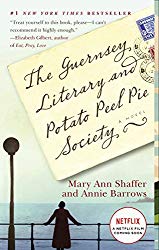“The Guernsey Literary And Potato Peel Pie Society” is a historical novel by Mary Ann Shaffer (finished by Annie Barrows due to the former’s ill health). It is an epistolary novel comprising letters and telegrams written by some of the characters to each other (as well as the odd set of diary-entries by one of them). It is an enjoyable novel that is partly funny and partly tragic and mostly romantic. It was recently adapted into an eponymous movie as well.
The novel begins in 1946, soon after the end of World War II, with the young author Juliet Ashton on a promotional book-tour. She is looking for something other than life under World War II that she has been writing about under a pen-name, but has not found the inspiration yet. She receives a letter from Dawsey Adams, a complete stranger living in Guernsey, who has chanced upon her old copy of a book by Charles Lamb in a bookshop on the island.
During her correspondence with Dawsey, she gets to know of The Guernsey Literary And Potato Peel Pie Society on the island and is intrigued by it. She then starts corresponding with some of the other members of this society and is so charmed by the story of its origin, its working, and especially the story of Elizabeth McKenna, that she decides to pay them a visit herself. This visit then ends up changing her life.
The society is a book-club that was accidentally formed during the German Occupation of the island to cover up for an illicit dinner of a roasted pig by some people, which would have otherwise attracted punishment from the German soldiers. They were then forced to hurriedly gather some books and meet regulary to keep up the appearance. Some of its initial members hadn’t read even a single book before in their life. However, they soon discover the joys of reading and find books that have become their favorites.
I was initially a bit skeptical about an epistolary novel retaining my interest and an American author being able to convincingly write about English characters from the past, but I must happily admit that I was proven wrong on both counts. The book remained interesting all the way to the end. It illustrates how terrible wars are even for the people not directly involved in it. The author has managed to concoct letters that develop the characters and advance the story while looking somewhat plausible. This is a good read and I would heartily recommend it.
